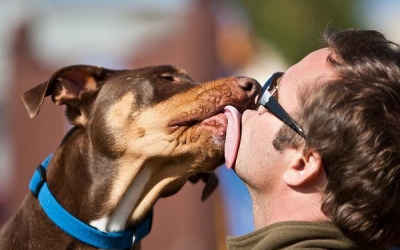- Latest news▼
-
19:41, April 25 Children’s Hospital Los Angeles and International Center of Professional Development Allergy/Immunology Conference

-
17:31, April 25 JAMA: patient grew long, curly eyelashes because of chemotherapy

-
11:08, April 25 Mpox epidemic declared in Republic of the Congo

-
08:31, April 25 OU: quitting smoking 4 times more likely to cure laryngeal cancer

-
01:20, April 25 Paralyzed man in China writes hieroglyphs using neural implants placed in his brain

-
15:11, April 24 Zombie deer disease possibly linked to hunters’ deaths

-
12:27, April 23 Appetite: Scientists found out the secret to the appeal of large portions of fast food

-
10:33, April 23 Scientists test new approach to fighting viruses

-
08:38, April 23 Ketamine may help with postpartum depression

-
22:12, April 22 Unhealthy amount of sugar found in baby food products of a well-known brand

-
19:41, April 22 Air pollution puts health of more than 1.6 billion workers globally at risk

-
17:25, April 22 Scientists found baked goods and lack of sleep to be more dangerous than alcohol

-
16:02, April 22 342 cases of measles recorded in Armenia so far in 2024

-
15:29, April 22 BrainStimulation: electrical brain stimulation alleviates anxiety and depression in the elderly

-
08:27, April 22 Cognitively stimulating jobs in midlife could lower dementia risk in old age, study finds

All materials
Kissing your dog could improve your health

Researchers at the University of Arizona believe microbes in a dog's gut may have a probiotic effect on the human body.
They dip their noses into all sorts of unsavoury places – but smooching your pet dog could actually be good for your health. Researchers at the University Arizona (UA) believe that the microbes contained in a dog's gut could have a probiotic effect on the human body - encouraging the growth of positive microorganisms.
And now these scientists are recruiting participants in the hope of proving their hypothesis.
"We've co-evolved with dogs over the millennia, but nobody really understands what it is about this dog-human relationship that makes us feel good about being around dogs," said Kim Kelly, an anthropology doctoral student and one of the primary investigators on the study.
The study is being conducted under the university's new Human-Animal Interaction Research Initiative, which aims to bring researchers from different disciplines together, to explore the mutual benefits of human-animal relationships.
Kelly will work alongside collaborators from the UA Department of Psychiatry, the UA Norton School of Family and Consumer Sciences, the UA School of Animal and Comparative Biomedical Sciences, and the University of California, San Diego, in order to explore whether living with a furry companion boosts physical and mental health in older adults.
"We think dogs might work as probiotics to enhance the health of the bacteria that live in our guts. These bacteria, or 'microbiota,' are increasingly recognized as playing an essential role in our mental and physical health, especially as we age," said Dr. Charles Raison, principal investigator for the study and a UA professor of psychiatry in the College of Medicine.
"We know that not all bacteria are good. We can get very sick from the 'bad' bacteria, and modern medicine has done a wonderful job of protecting us from various diseases that are created by these bacteria," said Raison.
"But unfortunately, by eliminating the bad bacteria we've started eliminating the 'good' bacteria, too."
Participants in the study will be paired with a dog from the humane society and live with the animal in their home for three months. At the start of the study the researchers will non-invasively evaluate the participants' gut bacteria, diet, physical activity levels and immune function. The dogs' gut bacteria and physical activity levels also will be measured via non-invasive means.
These tests will be repeated after one, two and three months to find out if there have been any positive impacts on gut microflora in either the humans or the dogs.
The participants will all be aged over 50 and will not have lived with a dog for at least six months.
Follow NEWS.am Medicine on Facebook and Twitter
- Video
- Event calendar
- Children’s Hospital Los Angeles and International Center of Professional Development Allergy/Immunology Conference
- First Armenian-German Conference entitled “Heart Failure Spring School”
- Allogeneic bone marrow transplant in case of hematological malignancy performed in Armenia for first time
All materials
- Archive
- Most read
month
week
day
- JAMA Oncology: Urine test can help rule out high-grade prostate cancer with almost 100% accuracy, study shows 1273
- Scientists grow human mini-lungs in lab 1157
- Next pandemic likely to be triggered by flu - scientists 920
- Scientists found baked goods and lack of sleep to be more dangerous than alcohol 844
- 342 cases of measles recorded in Armenia so far in 2024 802
- Blood test can determine who is at risk of developing multiple sclerosis - scientists 765
- Scientists develop new method to safely stimulate immune cells to fight cancer 764
- Cognitively stimulating jobs in midlife could lower dementia risk in old age, study finds 758
- BrainStimulation: electrical brain stimulation alleviates anxiety and depression in the elderly 706
- Unhealthy amount of sugar found in baby food products of a well-known brand 583
- Air pollution puts health of more than 1.6 billion workers globally at risk 579
- Ketamine may help with postpartum depression 567
- Appetite: Scientists found out the secret to the appeal of large portions of fast food 565
- Scientists test new approach to fighting viruses 549
- Zombie deer disease possibly linked to hunters’ deaths 445
- Find us on Facebook
- Poll





